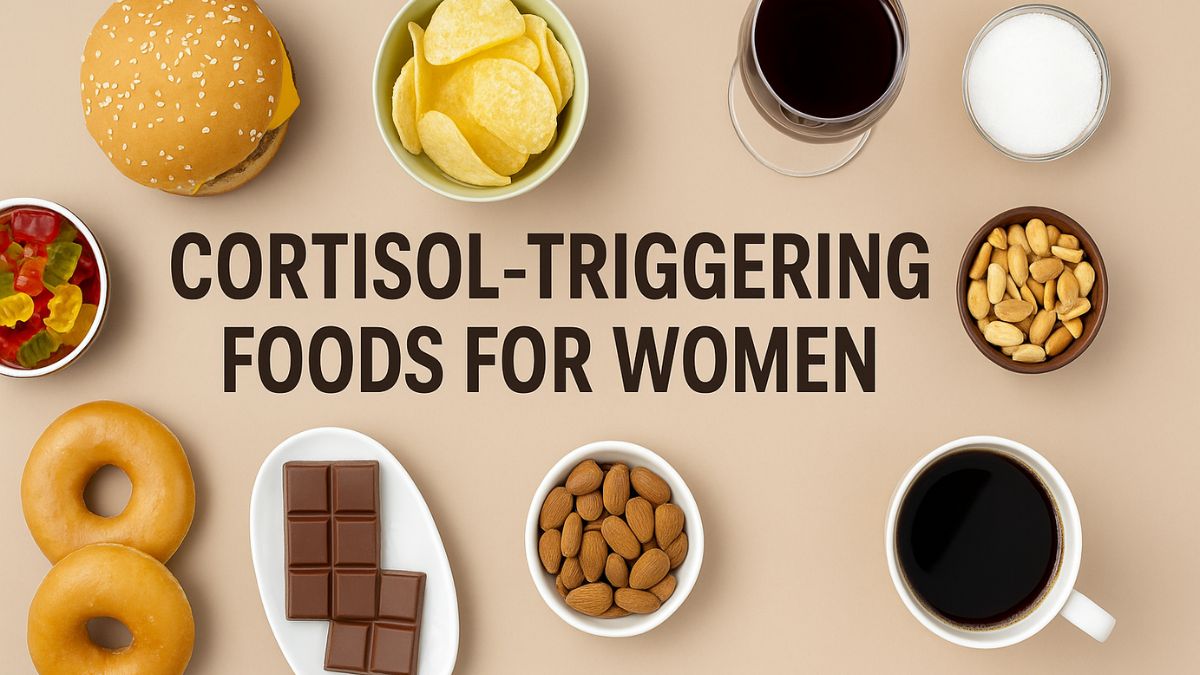New York: You wake up feeling already anxious. Coffee doesn’t help. Your afternoon snack turns into a craving spiral. Sound familiar?
If you’ve been feeling wired but tired, snapping over small things, or noticing stubborn weight around your belly, cortisol might be the culprit—and your diet may be feeding the problem.
Cortisol, your body’s main stress hormone, helps regulate everything from blood sugar and metabolism to inflammation and sleep. But when it stays too high for too long, it can mess with your mood, energy, skin, and even your period. And believe it or not, some foods can silently trigger or spike your cortisol levels without you even realizing it.
Let’s break down the top cortisol-triggering foods, especially for women—plus what to eat instead to feel calmer, lighter, and more balanced.
Also Read: How to Make Birria Tacos That Are So Good, You’ll Want to Dip Everything In Consommé
What Are Cortisol-Triggering Foods?
Cortisol-triggering foods are typically those that:
- Cause a rapid spike in blood sugar
- Lead to inflammation
- Overstimulate your adrenal glands
- Disrupt your gut microbiome
- Interfere with sleep and mood stability
When eaten in excess or at the wrong times, they can lead to chronically elevated cortisol—leaving you feeling stressed, wired, bloated, and emotionally drained.
Why Are Women More Sensitive to Cortisol-Spiking Foods?
Women’s hormones are already fluctuating across the month due to the menstrual cycle—and cortisol interacts closely with estrogen and progesterone.
High cortisol can worsen:
- PMS mood swings and cramps
- Hormonal acne
- Insomnia
- Weight gain, especially around the waist
- Anxiety and burnout
- Irregular periods or missed cycles
Women in perimenopause or with PCOS, thyroid issues, or adrenal fatigue are especially vulnerable to cortisol overload. That’s why knowing what foods to avoid (and what to embrace) is so important.
Cortisol-Triggering Foods to Avoid (Especially for Women)
Here are the biggest culprits:
1. Refined Sugar & High-Glycemic Carbs
Cookies, pastries, soda, white bread—these send your blood sugar on a rollercoaster, forcing your body to release cortisol to stabilize it.
Skip: doughnuts, sugary cereals, white rice, energy drinks
Swap: sweet potatoes, berries, oats, cinnamon for sweetness
2. Caffeine (Especially on an Empty Stomach)
That morning latte may be sabotaging your calm. Caffeine spikes cortisol—especially when you’re already stressed or haven’t eaten.
Skip: strong coffee before breakfast
Swap: matcha, tulsi tea, or coffee with protein + healthy fat
3. Alcohol
Alcohol disrupts your sleep, gut bacteria, and liver function—all of which can worsen cortisol spikes and increase inflammation.
Skip: nightly wine or cocktails
Swap: sparkling water with lime, kombucha, or adaptogenic mocktails
4. Ultra-Processed Packaged Foods
Think chips, instant noodles, and frozen snacks. These contain artificial ingredients, trans fats, and hidden sugars—all linked to higher cortisol.
Skip: microwave meals, packaged ramen
Swap: fresh whole meals, batch-cooked real food
5. Hydrogenated Oils and Fried Foods
Trans fats found in many fried or packaged foods increase inflammation, which leads to higher stress hormone activity.
Skip: fast food fries, packaged snacks
Swap: avocado oil, olive oil, homemade air-fried options
6. Excess Salt (Especially from Packaged Foods)
Salt in processed foods (not natural sea salt) causes water retention and makes your adrenals work harder.
Skip: canned soups, frozen pizza
Swap: homemade soups with sea salt or Himalayan pink salt
Also Read: Iron-Rich Foods List: What to Eat for Better Health
What Should Women Eat to Lower Cortisol?
If you’re trying to calm your nervous system and balance hormones, focus on foods that:
- Stabilize blood sugar
- Nourish your gut
- Are rich in magnesium, B vitamins, and antioxidants
Eat more of:
- Leafy greens (spinach, kale)
- Avocados
- Pumpkin seeds
- Fatty fish (like salmon)
- Blueberries
- Turmeric and ginger
- Dark chocolate (in moderation)
- Chamomile, tulsi, and ashwagandha teas
Bonus tip: Eat protein, fat, and fibre together at each meal to prevent sugar crashes and cortisol spikes.
Your Cortisol Reset Starts With the Next Bite
If your body’s been giving you stress signals—poor sleep, fatigue, cravings, mood dips—consider that it’s not just life stressing you out. It could be your diet quietly overstimulating your cortisol response.
Being intentional about what you avoid is just as important as what you include. Reducing cortisol-triggering foods, especially during PMS or burnout, can help you feel calmer, sleep better, and regulate your hormones naturally.
No crash diets. No extremes. Just simple, mindful choices that let your nervous system breathe.







